14 ways AI can improve your customer experience

What if you could make every customer interaction more efficient, personalized, and satisfying?
From AI chatbots to machine learning to predictive analytics—AI in CX is reshaping how businesses connect with, nurture, and support customers. These technologies allow you to automate routine tasks, predict customer needs, and tailor interactions at scale, easily handling complex data to make every customer experience feel more attentive, tailored, and rewarding.
In short, as the latest AI in CX research shows—AI is setting a new high standard for customer experience. In fact, 65% of customer experience (CX) professionals see AI as a strategic necessity that’s made all previous CX operations obsolete.
This raises the question—what’s the best way to apply AI to your customer experience?
In this article, we’ll explore how businesses are using AI chatbots, virtual assistants, and advanced analytics to level up their customer experience and drive customer satisfaction and loyalty like never before.

Leverage omnichannel AI for customer support
Understanding AI in customer experience
AI in customer experience (CX) involves using AI technologies like AI chatbots, machine learning, and predictive analytics to elevate customer satisfaction and loyalty to new heights.
Integrating AI tools allows a business to better understand and meet customers needs in real-time, processing unstructured data and tailoring interactions to deliver a more engaging and satisfying experience at every step.
From generative AI to machine learning to chatbots, AI technologies can be applied across the customer journey. What’s more, they help automate routine tasks and boost operational efficiency while creating a dynamic, personal CX that improves loyalty and satisfaction.
The true power of AI lies in its ability to process unstructured data, gather customer feedback using natural language processing, then leverage behavioral insights across integrated systems to achieve a new norm for excellence in customer experience.
Why does AI in customer experience matter?
No longer confined to the realm of science fiction, AI is fast becoming a staple of modern customer experience strategies. With AI spending forecast to reach $253 billion by 2025, a recent survey shows the top way businesses plan to use AI is for customer service.
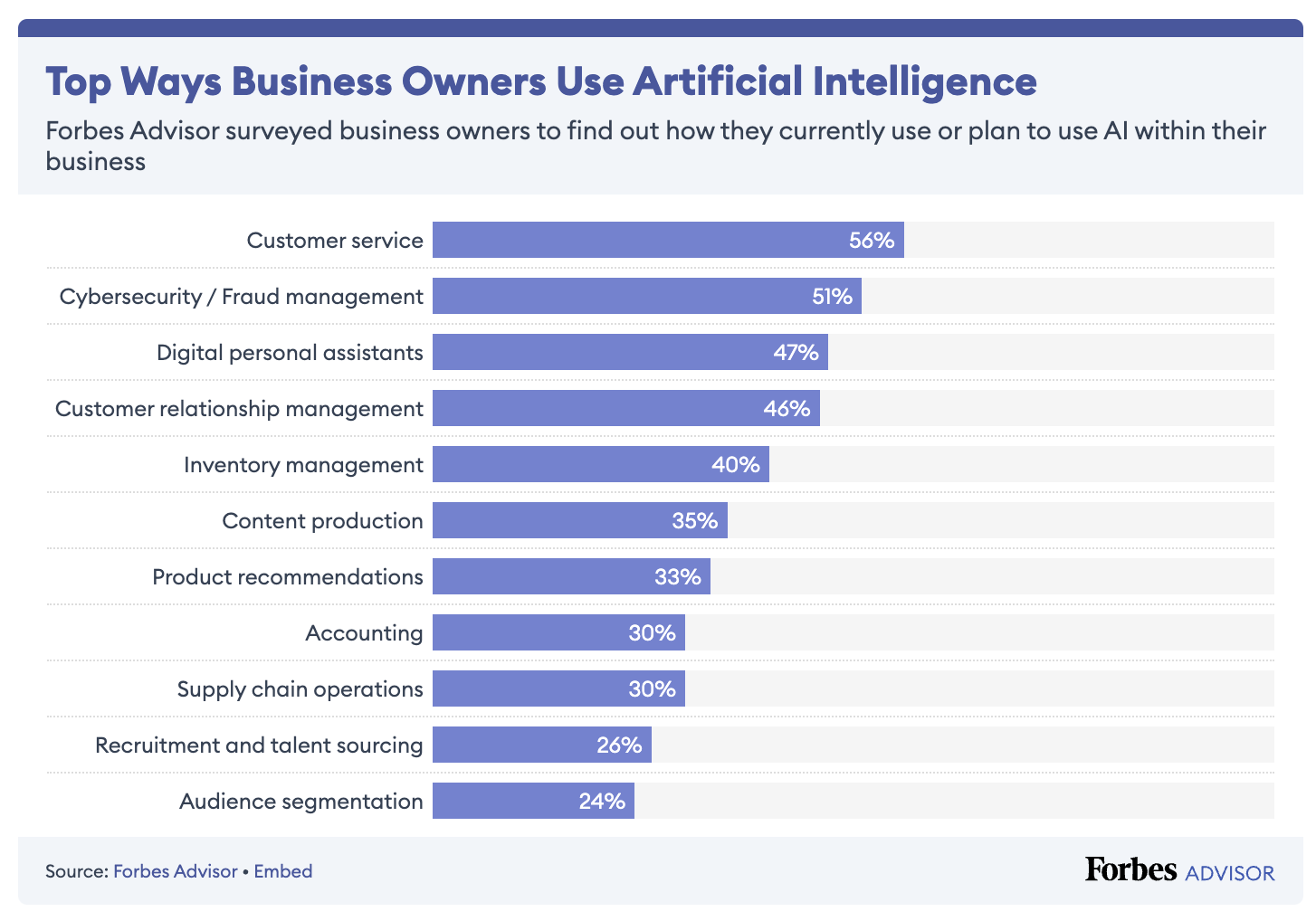
More than just a trend, AI is creating a new norm for tailored customer engagement. In the increasingly digital and customer-centric marketplace, effective AI integration is shaping up to be a major competitive advantage. Going without AI could soon be like an ecommerce brand refusing to offer free shipping.
Beyond offering a competitive edge, AI lets you have a conversation with customers. By using customer-facing tools and data processing together, you can be responsive and proactive, responding to queries instantly, enriching interactions, and delivering exceptional value. Opening a dialogue helps customers feel heard, supported, and appreciated, while strengthening relationships to positively impact customer behavior and loyalty.
14 ways to improve customer experience with AI
1. Provide instant support with AI chatbots
AI chatbots for customer service are a major upgrade to the support experience on websites and mobile apps. In a world where customers expect fast replies, ideally within an hour, offering instant support with conversational AI helps you meet customer expectations for timely 24/7 assistance.
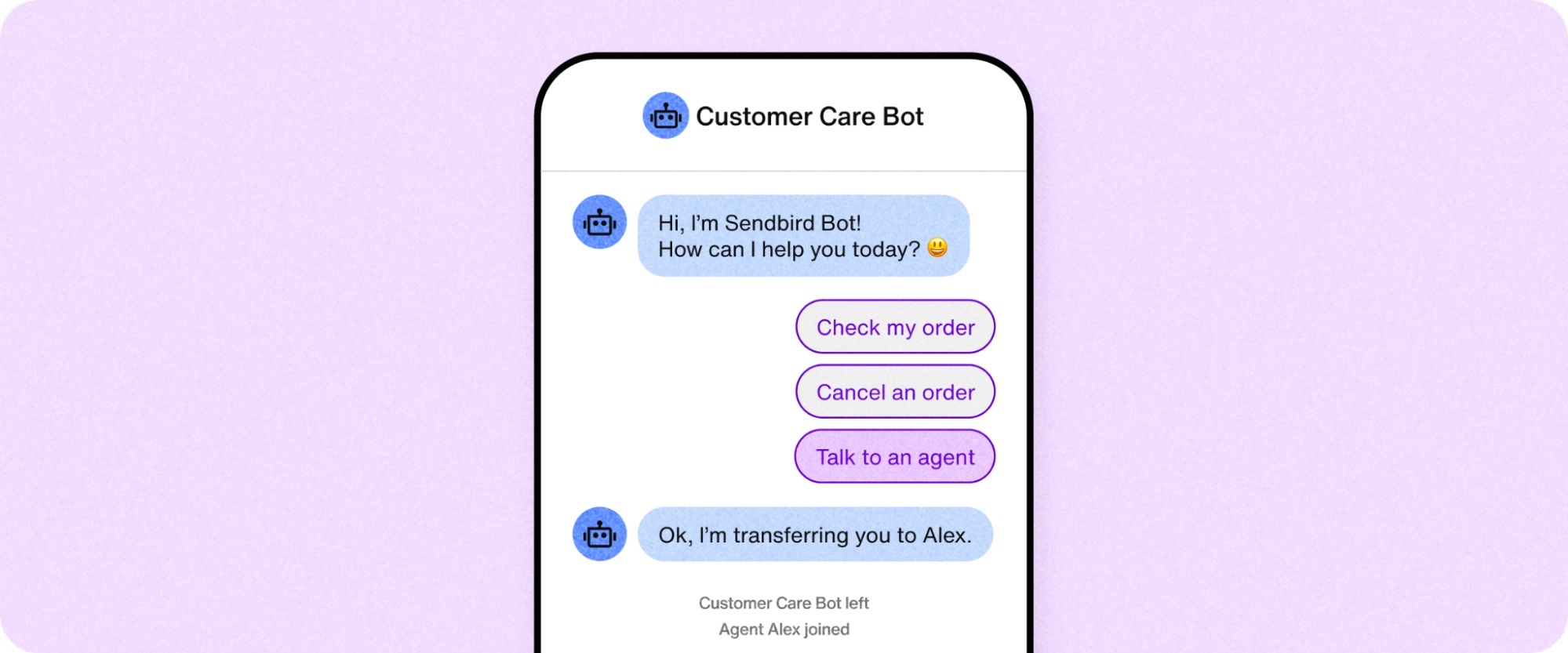
Equipped with natural language processing, AI chatbots are trained on your business data to provide accurate and relevant responses to customer queries. AI chatbots can handle 80% of routine support tasks, but also make seamless handoffs to human agents when needed. This frees up agents to focus on more complex tasks while enhancing CX with responsive and tailored support.
You can integrate AI chatbots with CRMs and support systems to:
Reduce support costs
Accelerate resolution times
Improve customer satisfaction and CSAT scores
2. Analyze data to improve customer experience
AI-powered tools enable you to analyze unstructured customer data and leverage it in real-time to spot improvements, eliminate friction, and reduce churn in your CX.
Equipped with predictive analytics and natural language processing, AI algorithms can analyze customer interactions for thousands of keywords, painting a clear picture of customer behavior, engagement, and overall satisfaction.
What’s more, sentiment analysis allows you to spot at-risk customers by flagging signs of disengagement. When combined with AI chatbots that solicit feedback, sentiment analysis lets you understand how customers feel in real-time. This way, you can make changes, offer support, and adjust your engagement strategies to resonate more with customers.
3. Make hyper-personalized recommendations
Once integrated with your tech stack, AI can act as a personal concierge to every customer. Equipped with customer history and preferences, AI chatbots and virtual assistants can provide relevant recommendations for content, products, and experiences that improve engagement and satisfaction.
In ecommerce, for example, AI virtual assistants give tailored suggestions to help customers find what they want quickly without poring over product listings.
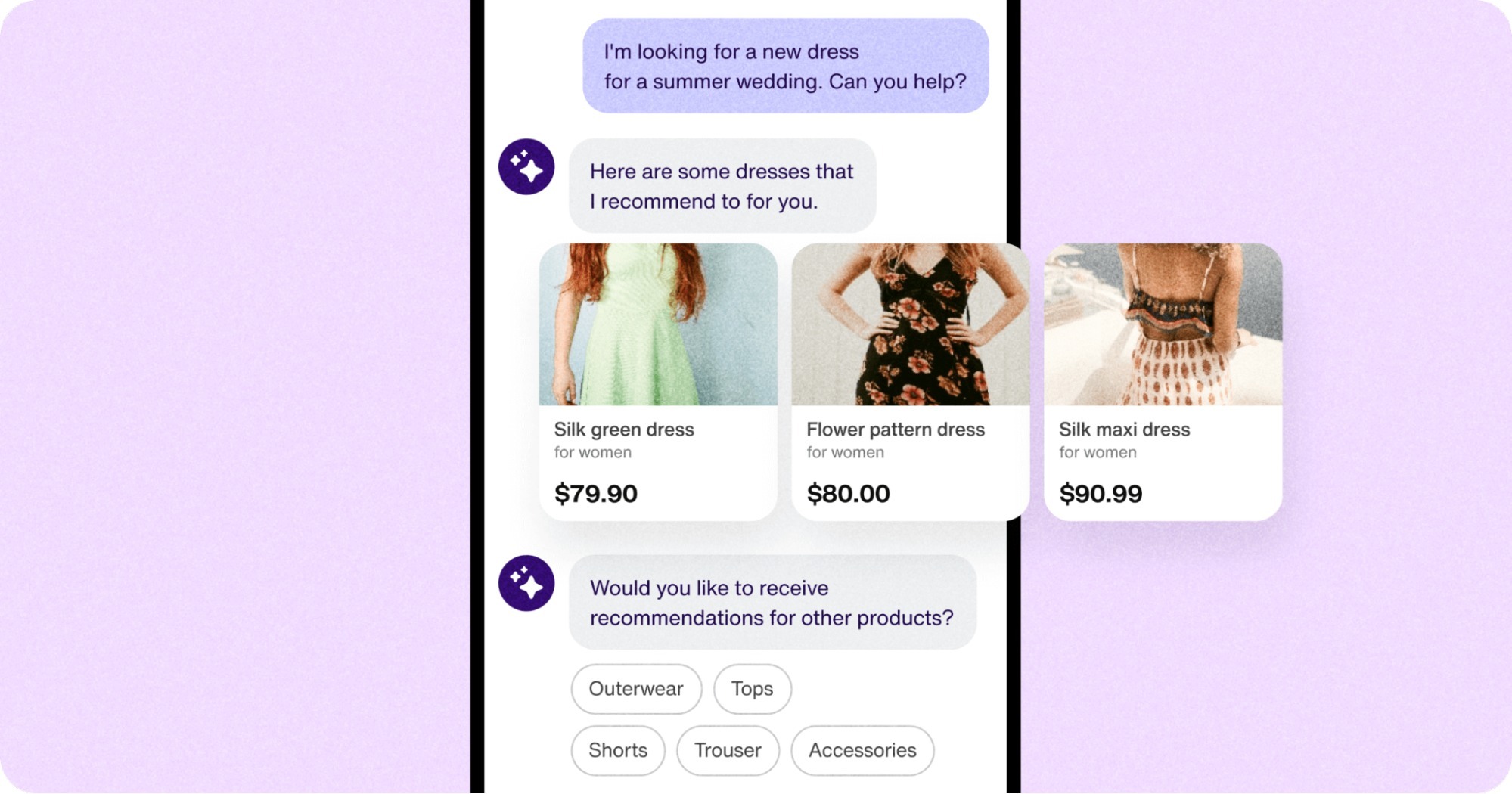
This level of personalization helps customers feel like they’re having a conversation with a helpful associate instead of a machine, improving the overall experience and satisfaction.
4. Personalize journeys at scale
Capable of processing vast amounts of user data, AI can create a uniquely tailored customer journey that’s individual to everyone.
With AI-driven segmentation tools, businesses can create unified, super-precise customer profiles that span multiple channels. Enabling more than tailored suggestions for products or content, this opens the door to one-to-one personalization that spans the entire customer journey—for a truly seamless experience that’s consistent wherever customers want to engage.
Whether used for targeted marketing, support, or conversions, AI segmentation and personalization can deliver meaningful interactions to each customer segment without human intervention.

Delight customers with AI customer service
5. Resolve issues proactively
According to James Dodkins, CX Expert at Pegasystems:
“Generative AI has allowed businesses to turn 'self-serve' into 'self-solve' for many customers. Businesses can present information to customers accurately and contextually, and it has guided customer service reps on calls, making interactions fast and frictionless to overall streamline and simplify many experiences.”
AI chatbots, for instance, can be custom-trained to provide highly accurate and relevant responses about a business at the exact moment customers want. In fact, 51% of consumers say they prefer support from chatbots when in need of immediate help.
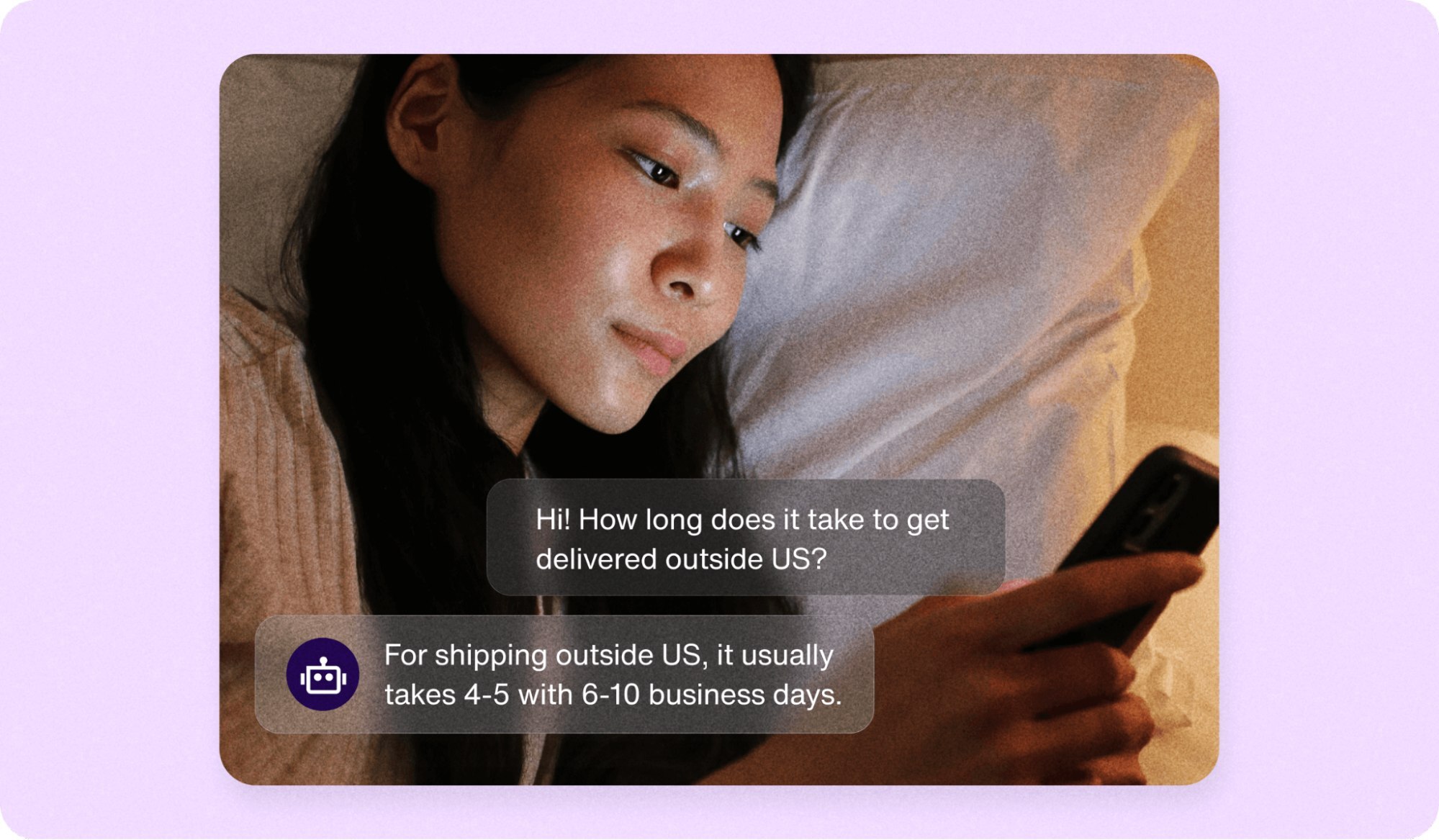
From answering FAQs to pulling self-serve resources from a knowledge base, AI allows a business to take a proactive yet responsive approach to customer support that’s more convenient and efficient, but also streamlines operations and reduces support workflows to save resources.
6. Enable autonomous scheduling
AI chatbots make it easy for customers to book and reschedule appointments or reservations without human help. Instead of waiting on the phone or sending emails, customers can quickly check availability and book appointments independently on your website or mobile app.
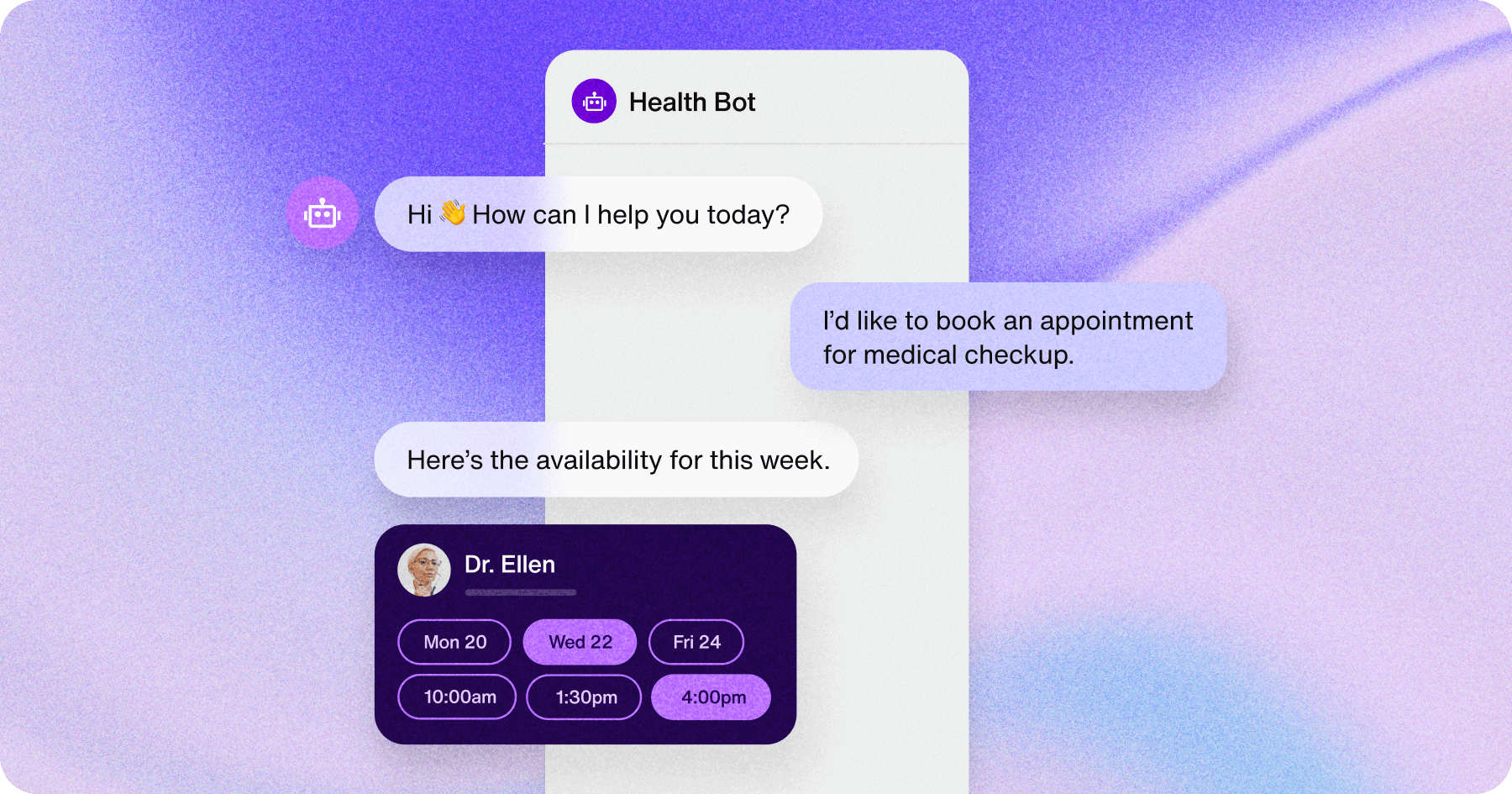
In healthcare, for instance, AI chatbots integrated with scheduling systems act as a convenient channel for self-serve scheduling that’s available 24/7. This adds a welcome layer of flexibility to the digital customer experience, saving time for everyone, streamlining operations, and ultimately improving attendance and customer satisfaction.
Read more: Learn how AI chatbots help healthcare providers to double response speed to customer inquiries.
7. Automate routine tasks
AI can handle routine tasks like answering FAQs, email management, and data entry, helping a business to streamline operations and be more personally attentive to the customer experience.
AI automation lets you concentrate on areas that reward human attention and expertise, such as live support, sales, and marketing. By freeing up employees to focus on higher-value activities, AI reduces the risk of human error to improve the accuracy and efficiency of human interactions. This shift toward AI-driven solutions allows for faster resolutions and fewer frustrations, and helps employees be at their best when interacting with customers.
8. Strengthen customer relationships
AI can improve customer relationships by making interactions feel more personal, responsive, and supportive. Conversational AI like chatbots are available to customers whenever they want, fostering a sense of attentiveness and personal care that’s foundational to strong relationships.
Through automation, data analysis, and personalization, AI ensures that every interaction—from bot responses to tailored suggestions—are both timely and relevant. Consistently providing a high level of service shows customers your business is reliable, helping drive satisfaction and loyalty with a reputation built on a history of customer care and appreciation.

Reinvent CX with AI agents
9. Enhance knowledge management
AI-powered solutions can present customers with relevant resources from your knowledge base to address common queries and solve problems. Additionally, they can identify low-performing content and suggest updates based on customer interactions.
By increasing access to your knowledge base and optimizing its content, customer experience AI helps ensure customers get the most out of their self-service interactions. This helps you reduce support queries, improve issue resolution, and drive customer success and retention.
10. Guide onboarding and customer success
AI helps to streamline onboarding and ensure customer success by guiding new users around your product experience. For example, AI chatbots or assistants can be added to mobile apps, providing tailored tips, highlighting features, and presenting resources to get users up to speed quickly. And based on prior interactions, AI can adapt to anticipate where future users will need help.
Like a proactive ChatGPT for your mobile app or product, AI can act as a digital concierge, helping users feel supported at every step and reducing frustration to improve the experience.
14 proven strategies to boost your app engagement
11. Deliver special offers
It always feels good to receive a special offer that’s meaningful to you, and AI can power these delightful moments. By analyzing customer data like purchase history, browsing behavior, and demographics in your CRM, AI can trigger targeted marketing messages like abandoned cart offers or cross-sells that are tailored to individual customers. Especially for birthdays or rewards programs, these relevant offers help users feel appreciated and stick around long-term.
12. Leverage predictive analytics
AI-driven predictive analytics can comb through historical data on customer interactions, purchases, and engagement to identify patterns and trends. In this way, AI can help you predict future customer actions and identify ways to improve the customer experience for greater loyalty and satisfaction, such as:
Forecasting demand
Identifying top products
Anticipating customer needs
Predicting trends
Mitigating future issues
Finding friction in product UX
13. Improve operational efficiency
AI for customer experience can automate or streamline a range of tasks to enhance efficiency, cut costs, and free employees to focus on high-value work. One study found that 54% of businesses saw greater efficiency and lower costs after implementing AI.
AI tools can save time and resources across departments:
Marketing: Generative AI accelerates the creation of high-quality content
Sales: Predictive AI boosts the efficiency and accuracy of lead scoring and segmentation
Operations: Inventory optimization with AI can prevent out-of-stock scenarios
Support: AI chatbot workflows reduce ticket volume and resolution times
Security: AI analytics cut down on security incidents
DevOps: Automate software testing to ensure quick, quality software releases at scale
14. Boost loyalty and retention
The ultimate payoff for integrating AI in the customer experience is more engaged and loyal customers. With customer-facing tools like AI chatbots and assistants, you can consistently deliver a more personalized, efficient, and supportive experience—but also solicit feedback from customers at key moments. This translates to greater feelings of brand trust, helping customers feel appreciated to drive engagement and loyalty in the long-term.
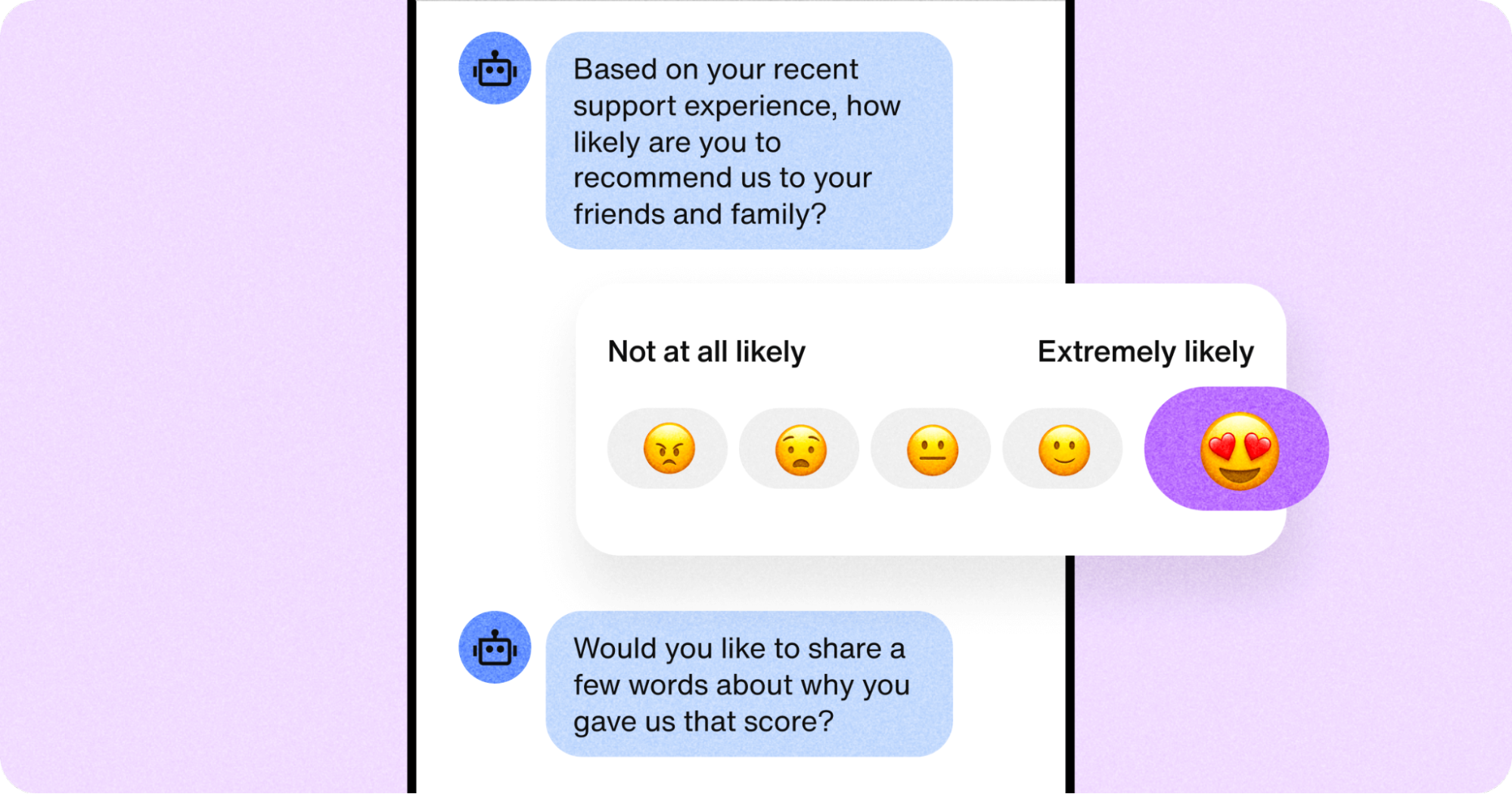
On the back end, businesses can analyze behaviors, anticipate future needs, and tailor services to meet ever-evolving customer expectations. This truly data-driven and responsive approach to engagement and support enables you to invest in what matters most: customer satisfaction.
AI agents: The future of AI in customer experience
After generative AI and predictive analytics, what’s next for AI in customer experience?
AI agents are a new class of AI that can do more than just assist—they promise to autonomously complete tasks and entire processes that once required human effort.
Imagine a virtual coworker that can execute complex workflows from start to finish, engaging customers, tailoring experiences, and solving problems beyond what’s possible with gen AI tools like chatbots to upgrade the customer experience. This includes:
Solving complex problems
Retrieving outside data
Taking actions
Analyzing conversations post-interaction
Enhance support experiences
For example, while an AI chatbot for healthcare can answer questions, schedule appointments, and surface tailored resources—AI agents go further by analyzing data on their own. They could check patient vitals, adjust treatment plans in real-time, predict health issues, even offer personalized therapy. While it's still early days for agentic AI, it represents a leap forward in what could become truly proactive and comprehensive customer support without human intervention.
Examples of AI in customer experience
To help inspire your own efforts, here are five examples of leading brands using AI for customer experience to great success.
1. Amazon: AI personalized product recommendations

Amazon is an online marketplace that pioneered AI-driven product recommendations. The AI algorithm analyzes factors such as customer behavior, search queries purchase history, as well as larger buying trends site-wide to present shoppers with an entire homepage of personalized recommendations. According to rebuyengine.com, 35% of Amazon's sales are due to personalization, and more than half (51%) of those shoppers are more likely to purchase in the future.
2. Redfin: AI virtual assistants for real estate
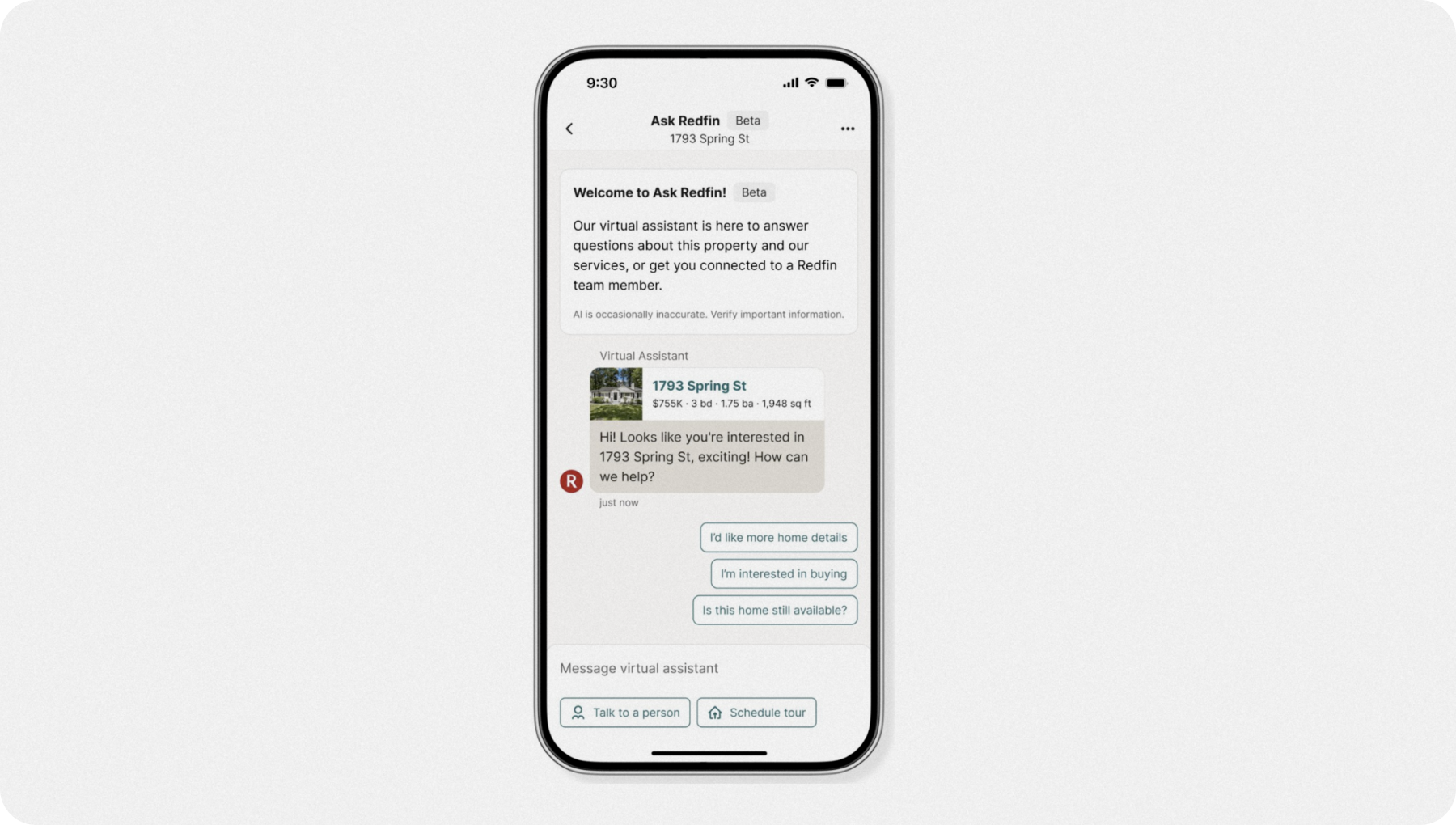
Redfin is a real estate platform that uses an AI virtual assistant to automate and accelerate its response times to customer queries. The Ask Redfin service uses an AI assistant to responsively provide users with listing information, local market conditions, and touring availability.
As part of their shift to digital-first customer service and communications, Redfin contacted Sendbird in search of AI for customer engagement — specifically, a business communications platform complete with APIs for AI virtual assistants, chatbots, and in-app chat.
Sendbird’s AI assistant and chat functionality help to streamline CX so much that Redfin saw 93% of users return to the app within a week.
3. Starbucks: AI customer experience and marketing

The Starbucks app uses predictive analytics and machine learning — a tool dubbed “Deep Brew” — to suggest product pairings, personalize suggestions, and target its cross-channel marketing.
The app’s AI considers granular factors: purchasing history, location, time of day, even the weather. By offering an AI customer experience attuned to real-life, Starbucks keeps app engagement up while driving high average order value (AOV) and customer loyalty.

Anywhere, anytime AI customer support
Greater expectations: Using AI in customer experience
With AI adoption on the rise, the quality of the average customer experience is set to reach new heights—and push customer expectations even higher.
As data-driven, tailored experiences become table stakes, businesses without AI in customer experience will fall behind. Fortunately, there are many new AI-powered solutions you can use to enhance interactions, gather insights, and implement AI in your customer experience.
If you’re looking to build a no-code AI chatbot for your website or mobile app in minutes, Sendbird can help. This blog shows you how to build a custom AI chatbot in minutes with just five easy steps. Or you can start a free AI chatbot trial with Sendbird and create an AI chatbot for free today.










